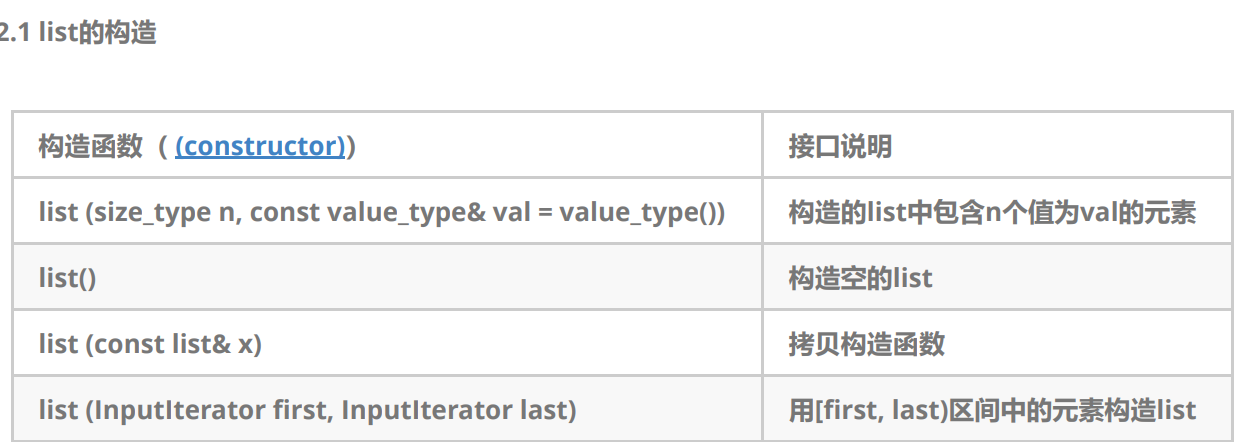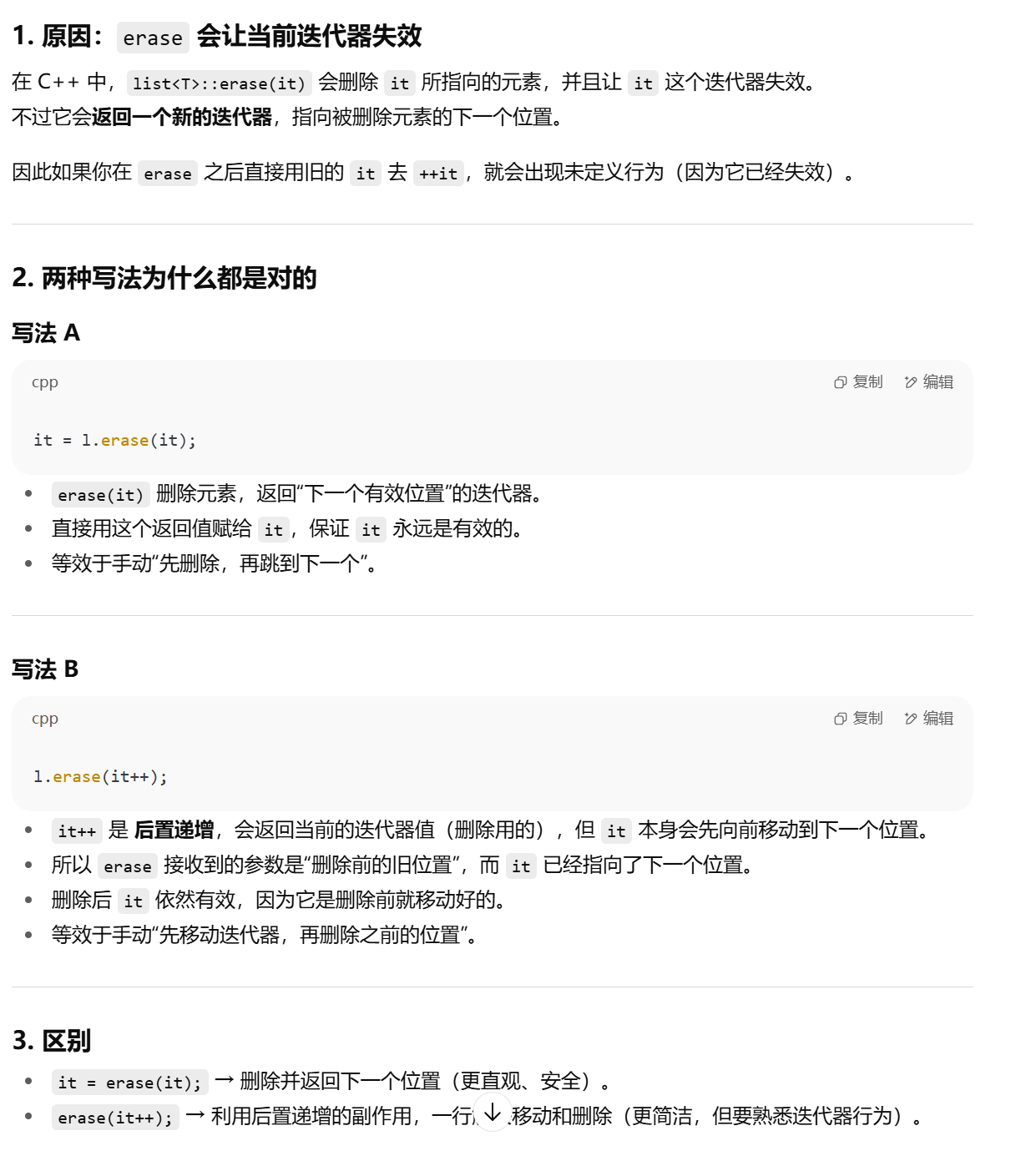list是带头双向循环链表

constructor
list的迭代器失效
即迭代器所指向的节点的无效,即该节点被删除了。因为list底层为带头结点的双向循环链表,所以在list中插入元素时不会导致迭代器失效,只有删除时才会失效,且失效的只是指向被删除节点的迭代器,其他迭代器不会被影响。
cpp
#include <iostream>
#include <list>
using namespace std;
void test1()
{
int arr[] = { 1,2,3,4,5,6,7,8,9,0 };
list<int> lt(arr, arr + sizeof(arr) / sizeof(arr[0]));
auto it = lt.begin();
while (it != lt.end())
{
lt.erase(it);//erase函数执行后,it所指向的节点
//已被删除,因此it无效,在下一次使用it时,必须先给其赋值。
++it;
}
}
//改正:
void test2()
{
int arr[] = { 1,2,3,4,5,6,7,8,9,0 };
list<int> lt(arr, arr + sizeof(arr) / sizeof(arr[0]));
auto it = lt.begin();
while (it != lt.end())
{
it = lt.erase(it);
//lt.erase(it++);
}
for (auto e : lt)
{
cout << e << " ";
}
cout << endl;
}
int main()
{
//test1();
test2();
return 0;
}
list的模拟实现
cpp
#pragma once
#include <iostream>
#include <assert.h>
using namespace std;
namespace Q
{
template<class T>
struct list_node
{
list_node<T>* _next;
list_node<T>* _prev;
T _val;
list_node(const T& val = T())
:_next(nullptr)
, _prev(nullptr)
, _val(val)
{ }
};
template<class T,class Ref,class Ptr>
struct _list_iterator
{
typedef list_node<T> Node;
typedef _list_iterator<T, Ref, Ptr> self;
Node* _node;
_list_iterator(Node* node)
:_node(node)
{ }
Ref operator*()
{
return _node->_val;
}
Ptr operator->()
{
return &_node->_val;
}
self& operator++()
{
_node = _node->_next;
return *this;
}
self operator++(int)
{
self tmp(*this);
_node = _node->_next;
return tmp;
}
self& operator--()
{
_node = _node->_prev;
return *this;
}
self operator--(int)
{
self tmp(*this);
_node = _node->_prev;
return tmp;
}
bool operator!=(const self& it) const
{
return _node != it._node;
}
bool operator==(const self& it) const
{
return _node == it._node;
}
};
template<class T>
class list
{
typedef list_node<T> Node;
public:
typedef _list_iterator<T, T&, T*> iterator;
typedef _list_iterator<T, const T&, const T*> const_iterator;
iterator begin()
{
return iterator(_head->_next);
}
iterator end()
{
return (iterator)_head;
}
const_iterator begin() const
{
return const_iterator(_head->_next);
}
const_iterator end() const
{
return (const_iterator)_head;//???
}
void empty_init()
{
_head = new Node;
_head->_prev = _head;
_head->_next = _head;
_size = 0;
}
list()
{
empty_init();
}
list(const list<T>& lt)
{
empty_init();
for (auto& e : lt)
{
push_back(e);
}
}
void swap(list<T>& lt)
{
std::swap(_head, lt._head);
std::swap(_size, lt._size);
}
list<T>& operator=(list<T> lt)
{
swap(lt);
return *this;
}
void clear()
{
iterator it = begin();
while (it != end())
{
it = erase(it);
}
_size = 0;
}
~list()
{
clear();
delete _head;
_head = nullptr;
}
void push_back(const T& x)
{
insert(end(), x);
}
void push_front(const T& x)
{
insert(begin(), x);
}
void pop_back()
{
erase(--end());
}
void pop_front()
{
erase(begin());
}
iterator insert(iterator pos, const T& x)
{
Node* cur = pos._node;
Node* prev = cur->_prev;
Node* newnode = new Node(x);
prev->_next = newnode;
newnode->_prev = prev;
newnode->_next = cur;
cur->_prev = newnode;
++_size;
return (iterator)newnode;
}
iterator erase(iterator pos)
{
assert(pos != end());
Node* cur = pos._node;
Node* prev = cur->_prev;
Node* next = cur->_next;
prev->_next = next;
next->_prev = prev;
delete cur;
--_size;
return (iterator)next;
}
size_t size()
{
return _size;
}
private:
Node* _head;
size_t _size;
};
void print(const list<int>& lt)
{
list<int>::const_iterator it = lt.begin();
while (it != lt.end())
{
cout << *it << " ";
++it;
}
cout << endl;
}
void test_list1()
{
list<int> lt;
lt.push_back(1);
lt.push_back(2);
lt.push_back(3);
lt.push_back(4);
lt.push_back(5);
lt.push_back(6);
list<int>::iterator it = lt.begin();
while (it != lt.end())
{
(*it) += 1;
cout << *it << " ";
++it;
}
cout << endl;
for (auto e : lt)
{
cout << e << " ";
}
cout << endl;
}
}